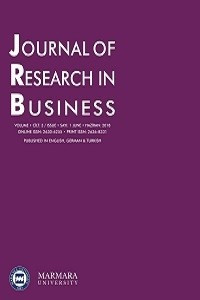Basic Factors That Affect The Students' Attitudes Towards Accounting Courses: A Research
Accounting courses have a specific logic which should be instructed in the best way during lessons. Students who conceive this basic logic like and show interest to accounting courses and those who don’t conceive it become disinterested. In general, student’s success in courses such as Inventory and Balance Sheet, Financial Statement Analysis etc. which are follow-ups of Financial Accounting courses vary depending on their general accounting knowledge. This means that the basis of accounting education consists of initially provided general accounting knowledge. This research aims to determine the prominent factors that affect the students’ adequately receiving such initially provided knowledge, and the most important factor has been determined as “academicians/instructors” based on the survey involving student from three universities.
___
- Adolf G. C., A. Haller and K. Uwe Marten (1999). Accounting Education for Professionals in Germany-Current State and New Challenges, Journal of Accounting Education, 17.
- Barbara A., S. F. Watson, J. M. Hassell and S. A. Webber (2001). Accounting Education Literature Review (1997-1999)”, Journal of Accounting Education, 19.
- Bryan H. (2003). “Accounting Practice In The Millennium: Is Accounting Education Ready To Meet The Challenge?, The British Accounting Review 35.
- Bui, B., and Porter, B. (2010). “The Expectation-Performance Gap In Accounting Education: An Exploratory Research”, Accounting Education: An International Journal, 19(1-2), 23-50.
- Çelik, O., A. Ecer (2009). Efficiency in Accounting Education: Evidence from Turkish Universities, Critical Perspectives on Accounting.
- Ezeani, N., & Akpotohwo, F. C. (2014). Integrating Information and Communication Technology (ICT) in Accounting Education Instruction in Ekiti State Universities, International Journal of Business and Social Science, Vol. 5, No. 6(1); May.
- Gençtürk M., Y. Demir, O. Çarıkçı (2008). Meslek Yüksekokulu Öğrencilerinin Muhasebe-Finans Eğitimine Bakış Açıları ve Farkındalıkları Üzerine Bir Uygulama, Süleyman Demirel Üniversitesi, İ.İ.B.F. Dergisi, 13(1): 225-226.
- Gordon B. (2004). Critical Accounting Education: Teaching and Learning outside the Circle, Critical Perspectives on Accounting 15.
- Hatunoğlu, Z. (2006). “Muhasebe Eğitiminde Bilgi Teknolojisi Kullanımının Sunum Kalitesine Olan Etkilerinin Tespitine İlişkin Bir Araştırma, Mufad Journal, Sayı: 30, Nisan: 190-200.
- Hoque, Z. (2002). Using Journal Articles to Teach Public Sector Accounting in Higher Education, Journal of Accounting Education 2.
- Joyce A. S. – J. C. Flagg and S. A. Holmes (2000). Job Perceptions and Turnover Behaviour Of Tenure-Track Accounting Educators, Journal of Accounting Education, 315-340.
- Kızıl, C., İ. E. Çelik, V. Akman and D. Danışman (2015). Muhasebe Dersini İlk Kez Alan Öğrencilerin Başarısına Etki Eden Faktörlerin Tespiti: Yalova Üniversitesi’nde Bir Uygulama, İşletme Bilimi Dergisi, 3(2): 128-165.
- Steve W. A. and R. J. Sack (2001). The Perilous Future of Accounting Education, The CPA Journal; Mart; 71, 3; ABI/INFORM Global, s.18.
- Tekşen, Ö., M. Tekin, M. Gençtürk (2010). Muhasebe Eğitiminin Değerlendirilmesi: Mehmet Akif Ersoy Üniversitesi’ne Bağlı Meslek Yüksekokulları Öğrencileri Üzerine Bir Araştırma, Mufad Journal, 46: 100-112.
- Tuğay, O. (2014). Muhasebe Dersi Alan Öğrencilerin Muhasebe Dersine Yönelik Algıları Ve Muhasebe Öğretim Elemanlarından Beklentileri Üzerine Mehmet Akif Ersoy Üniversitesinde Bir Araştırma, Eskişehir Osmangazi Üniversitesi İİBF Dergisi, Aralık, 9(3),49 – 68.
- Ünal, O. – M. Doğanay (2009). Lisans Düzeyindeki Muhasebe Eğitiminin Etkinliği, Sayıştay Özelinde Ampirik Bir Çalışma”, Sayıştay Dergisi, Sayı: 74-75, Temmuz-Aralık: 117-138.
- Wolk C., T. Schmidt and J. Sweeney (1997). Accounting Educators’ Problem Solving Style and Their Pedagogical Perceptions And Preferences, Journal of Accounting Education, 15:4.
- Yayla, H.E. and E. Cengiz (2005). “Muhasebe Mesleğinin Tercih Edilmesinde Etkili Olan Faktörlerin Belirlenmesine Yönelik Bir Alan Çalışması: Karadeniz Teknik Üniversitesi Örneği, Muhasebe ve Denetime Bakış Dergisi, Eylül.
- Z. Jun Lin, X.Xiong, Min Liu (2005). Knowledge Base and Skill Development in Accounting Education: Evidence From China, Journal of Accounting Education, 2005, 149-150.
- Yayın Aralığı: Yılda 2 Sayı
- Başlangıç: 2016
- Yayıncı: Marmara Üniversitesi
